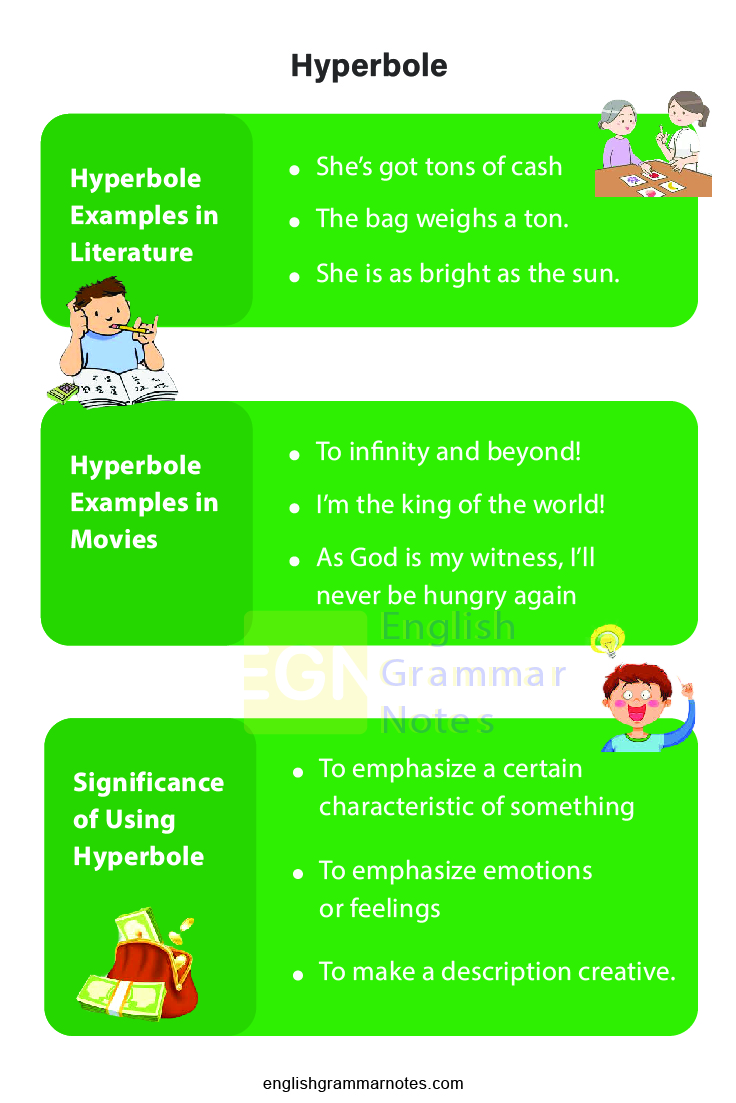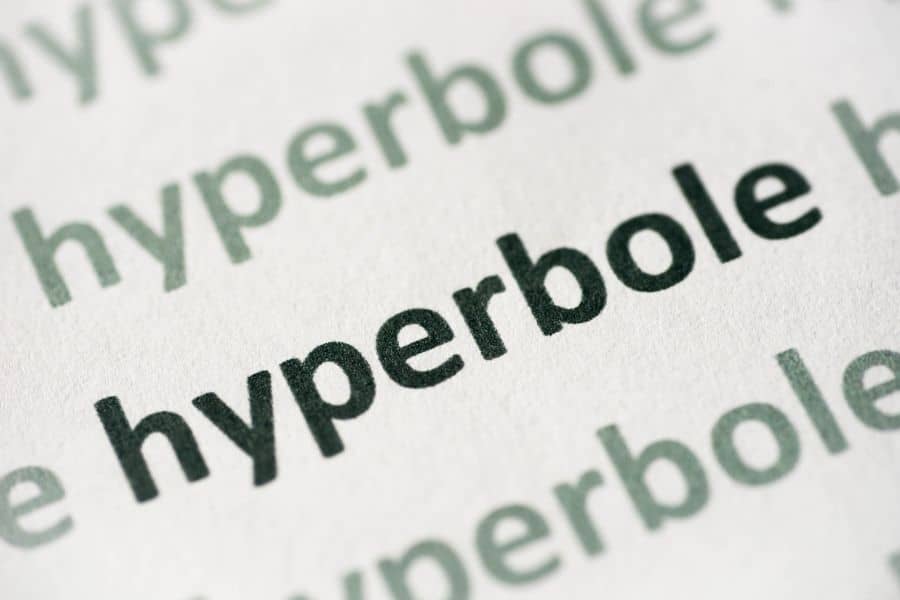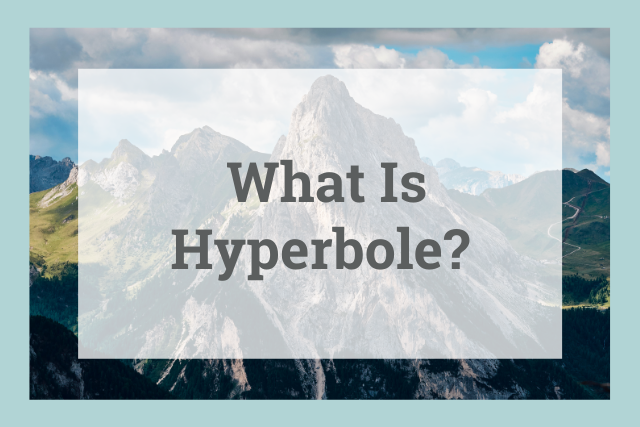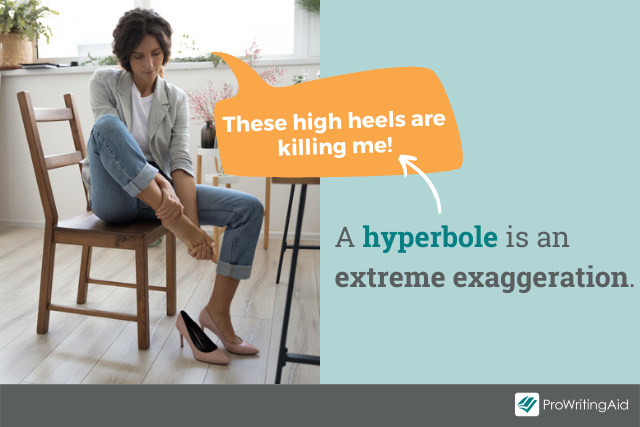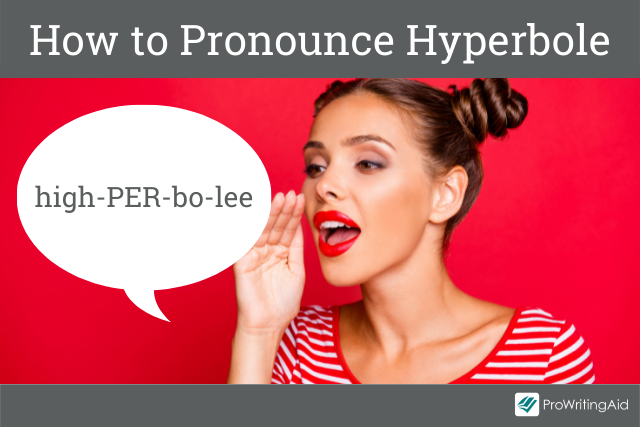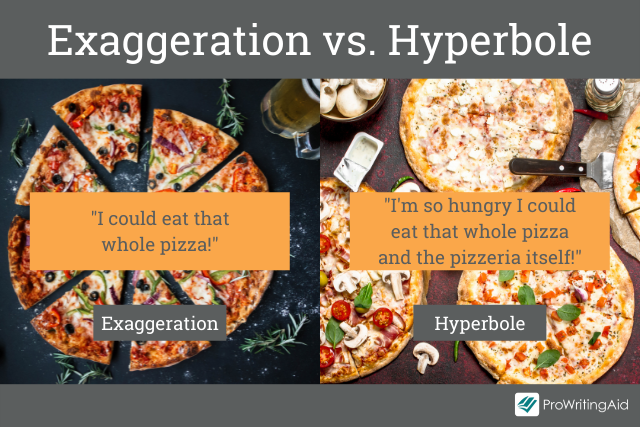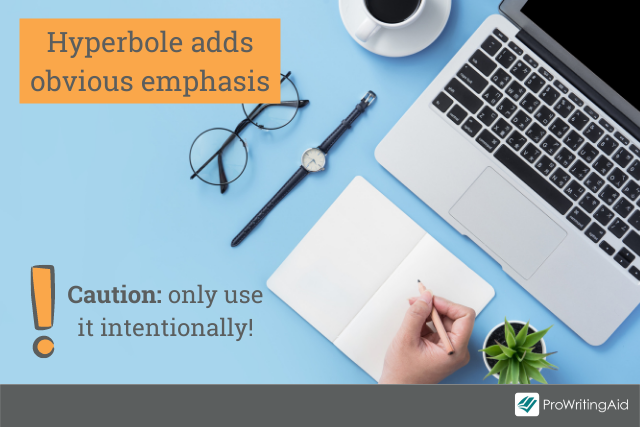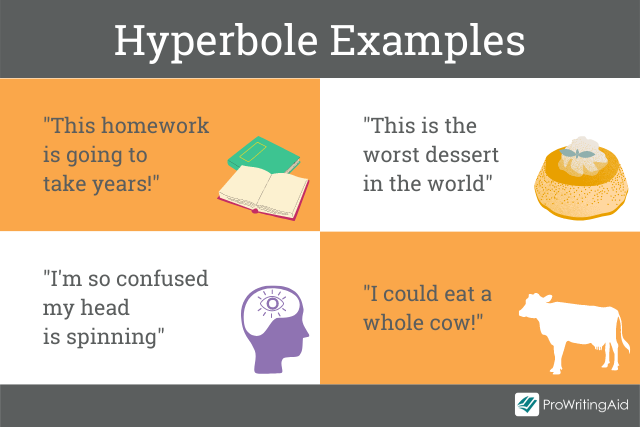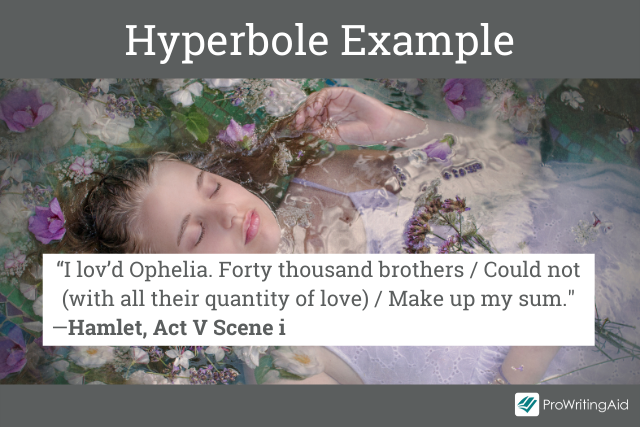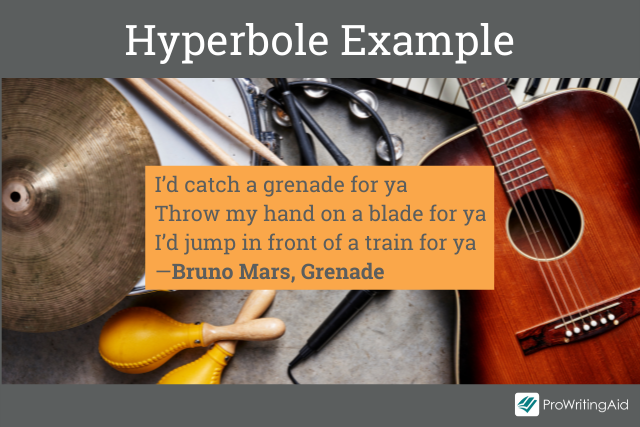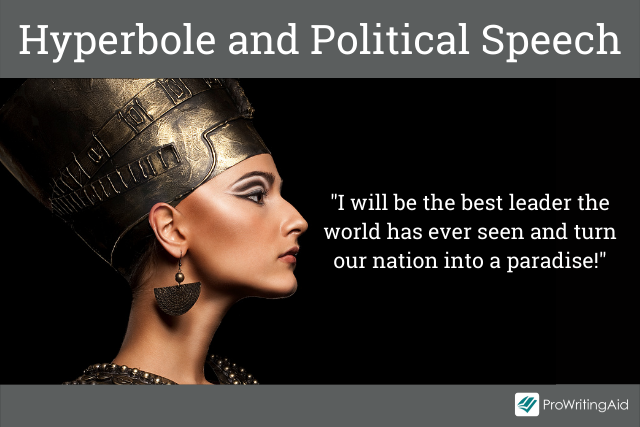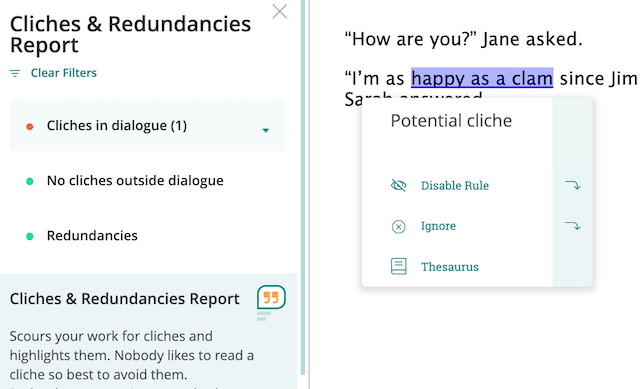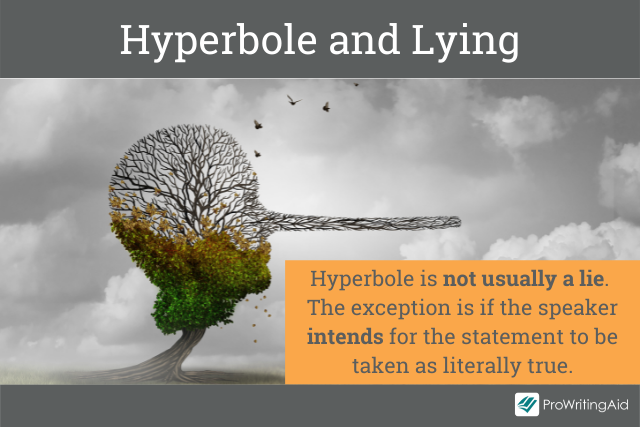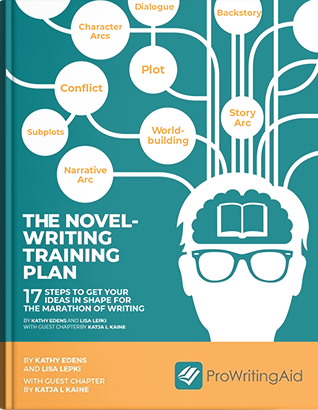Hyperbole is a figure of speech that helps you create a heightened effect through exaggeration. Hyperbole can be considered as an exaggerated or overstated statement that adds emphasis to a sentence or line. Hyperbole can be used to produce ironic, serious, or comic effects.
The use of hyperbole is most apt in satires. The use of hyperbole in satire makes ideas, events, or persons larger than life or lesser than life with its exaggeration. Some of the closest synonyms that can be associated with hyperbole include: overplaying, exaggeration, overstatement, magnification, excess, overkill, or puffery.
- Origin of the Word Hyperbole
- Hyperbole Examples in Literature
- Hyperbole Examples in Movies
- Hyperbole and Overstatement
- Hyperbole vs Simile and Metaphor
- Significance of Using Hyperbole
- How to write a Hyperbole?
- FAQs on Hyperbole
Origin of the Word Hyperbole
The word hyperbole has its roots in the Greek word “huperbole” meaning to “throw above”.
Hyperbole Examples in Literature
More than a literary device, hyperbole is a technique that is used even in everyday conversation. Given below is a list of everyday usage of hyperbole:
- She’s got tons of cash
- The car was faster than lightning
- I am going to die of embarrassment.
- He is so hungry that he can eat a horse
- The bag weighs a ton.
- She is as bright as the sun.
Hyperbole Examples in Movies
Today, even movies make use of the figure of speech, hyperbole. Given below are a few hyperboles used in famous movies:
- To infinity and beyond! (Toy Story)
- I’m the king of the world! (Titanic)
- As God is my witness, I’ll never be hungry again (Gone with the Wind)
Hyperbole and Overstatement
Even though the terms hyperbole and overstatement are used interchangeably, there exist subtle differences between them. A hyperbole like an overstatement is an exaggeration, but its effect is often more excessive than an overstatement. However, both of these can be considered literary devices.
Hyperbole vs Simile and Metaphor
Like Simile and Metaphor, hyperbole is not a figure of speech used for comparison. On the other hand, hyperbole is an extravagant overstatement not meant to be taken literally.
Significance of Using Hyperbole
Hyperbole is used commonly for the following reasons:
- To emphasize a certain characteristic of something
- To emphasize emotions or feelings
- To make a description creative.
- To inject humor or irony into the context.
How to write a Hyperbole?
Now that you are already familiar with what hyperbole is and various examples, using them becomes pretty much simple.
- Decide on what is that you want to describe
- Think of any quality of the thing that you intend to describe and exaggerate
- Now directly from for a creatively exaggerated way to describe that.
See More:
- Anaphora
- Symbolism
FAQs on Hyperbole
1. What is Hyperbole?
Hyperbole is a figure of speech that creates a heightened effect through exaggeration. Hyperbole can be considered as an exaggerated or overstated statement that adds emphasis to a sentence or line.
2. What are some of the common examples of hyperbole?
Some examples of hyperbole include:
- The bag weighs a ton.
- I am so tired that I can sleep for a month
- She’s got tons of cash
- The car was faster than lightning
3. What are the benefits of using hyperbole?
The benefits of using hyperbole include
- It helps to emphasize a certain characteristic of something or emotions or feelings.
- Hyperbole also makes a description creative and injects humor or irony into the context.
Conclusion
Hyperbole is one of the simplest techniques by which you can make your writings unique and creative. The use of hyperbole helps you to emphasize the main idea you intend to convey. If used appropriately, a hyperbole’s effect is large and impactful, thereby drawing the attention of the reader. However, be careful not to overdo the overstatement!
Do you need some hyperbole examples to add to your stock of writing skills?
Are you ready to add excitement and drama to your work?
You can use hyperbole in various ways to make your writing have a bigger impact on readers.
It’s an excellent approach for adding emphasis when no single words are strong enough to evoke the feeling you want your readers to experience.
But if you’re uncertain which hyperboles will add pizazz to your prose, having some examples might get your creative juices a-flowin’!
With our list of hyperbole examples, your next writing piece will be the best piece of writing ever! (See what I did there?)
Let’s get this show on the road, shall we?
Hyperbole Definition
Hyperbole is figurative language or a literary device that uses deliberate and extreme exaggeration to create a strong emotional response from the reader, emphasize a statement, or add a sense of drama.
For example, you might say I’m so hungry I could eat a horse.
You couldn’t literally eat an entire horse. Still, you want to emphasize how hungry you are and how enormous your appetite is.
Why Use Hyperbole?
There are many reasons a writer might use hyperbole in their work:
- You could use hyperbole to exaggerate a point.
- You might want to emphasize something about an event, person, or situation.
- You might use it as a rhetorical device to persuade readers to the narrator’s point of view with a more compelling argument.
For example, That copywriting course is the best thing ever to happen to copywriters everywhere.
I mean, the course might be good, but for it to be the best thing ever for copywriters everywhere is hyperbole.
You can also use hyperbole to:
- Make or emphasize a point
- Show contrast between two ideas
- Grab the reader’s attention
- Set the scene for the story
- Add interest to an otherwise bland description
- Add humor to the situation
You do need to be careful not to overuse it in your writing. Hyperbole will lose its effect if everything is hyperbolic.
Examples of Hyperbole from Everyday Speech

We often use hyperbole in everyday speech to make things more dramatic than they really are. Sometimes it’s to be humorous, but occasionally it’s to target other powerful emotions.
Here are a few common examples of hyperbole you’ll find in everyday conversation. How many times have you used any of the following hyperbolic statements?
- I’m dying of laughter.
- This box weighs a ton.
- I haven’t seen him in a million years.
- Our neighbor is older than dirt.
- This was the best day ever.
- I waited in line at the pharmacy forever.
- She thought she would die of embarrassment.
- My 16th birthday will never come.
- This knee brace is killing me.
- They’ve got more money than God.
- I have a million things to do this week.
- Their new house cost a gazillion dollars.
- When we were younger, we were so poor we didn’t have two cents to rub together.
- She has tons of makeup.
- You could’ve knocked me over with a feather.
- He loves you more than life itself.
- I’m so angry, I could eat a hat.
- He was dying of thirst.
- That baby is the cutest thing ever.
- There was an ear-splitting shriek.
- It’s so cold, you’ll get hypothermia the second you step outside.
- I’m addicted to buying books.
- I’ve been buried under a mountain of editing.
- That is the worst thing I’ve ever heard.
- The chocolate cake was the best cake ever.
- This assignment is going to be the death of me.
Examples of Hyperbole from Literature

Writers use hyperbole in literature to emphasize character traits or story themes.
But more important, hyperbole grabs the reader’s attention and pulls them into the story.
Let’s dive into some examples.
27. Old Times on the Mississippi by Mark Twain
I was quaking from head to foot, and could have hung my hat on my eyes, they stuck out so far.
Obviously, it was an exaggeration to say the narrator’s eyes stuck out that far, but Twain wanted to emphasize the speaker’s fear and shock.
28. Heart of Darkness by Joseph Conrad
I had to wait in the station for ten days—an eternity.
While we are all familiar with the difficulty of waiting, we also know that waiting for ten days isn’t an eternity, even if it feels like it in the moment.
29. A Man May Tear a Jewel by Bhartrihari
A man may tear a jewel
From a sea monster’s jaws,
Cross a tumultuous sea
Of raging tides,
Or twine garlandwiseA wrathful serpent on his head.
But no man can alter
The thoughts of an obstinate fool.
Bhartrihari wants us to understand how difficult it is to convince someone they are wrong. He says it would be easier to wrestle a sea monster for a jewel or wrap a snake around your head.
30. Slaughterhouse-Five by Kurt Vonnegut
There was a firestorm out there. Dresden was one big flame. The one flame ate everything organic, everything that would burn.
Here Vonnegut uses hyperbole to show the readers how intense and horrifying it was in Dresden right after the World War II bombing.
31. Macbeth by William Shakespeare
Neptune’s ocean wash this blood
Clean from my hand? No. This hand will rather
The multitudinous seas incarnadine,
Making the green one red.
Shakespeare uses hyperbole to show how shameful and revolted Macbeth feels after killing King Duncan. He says his hands are so red with blood that washing them in the sea would turn the sea red.
32. As I Walked Out One Evening by W.H. Auden
I’ll love you, dear, I’ll love you
Till China and Africa meet,
And the river jumps over the mountain,
And the salmon sing in the street.
Auden uses hyperbole to show us his love is so profound, so great that rivers will jump over mountains.
33. To Kill a Mockingbird by Harper Lee
Molasses buckets appeared from nowhere, and the ceiling danced with metallic light.
Harper Lee uses hyperbole to show how the buckets seemed to appear from thin air.
Examples of Hyperbole from Film & TV

Hyperbole in movies and tv makes for memorable lines we quote repeatedly. How many of these lines from film have you used in your life?
34. Toy Story
To infinity and beyond!
35. Elf
You did it! Congratulations! World’s best cup of coffee. Great job, everybody.
36. A Christmas Story
(Ralphie) I want an official Red Ryder, carbine action, two-hundred shot range model air rifle!
(Mother Parker) No. [You’ll] Shoot your eye out.
37. Love Story
Love means never having to say you’re sorry.
38. Despicable Me
A unicorn! He’s so fluffy I’m gonna die!
39. 101 Dalmatians
I’m hungry, Mother, I’m hungry…I’m so hungry I could eat a whole elephant!
40. The Sandlot
(Ham) You want a s’more? (Smalls) I haven’t had anything yet, so how can I have some more of nothing?
(Ham) You’re killin’ me, Smalls!
41. Beauty and the Beast
When I was a lad, I ate 4 dozen eggs every morning to help me get large. And now that I’m grown, I eat 5 dozen eggs, so I’m roughly the size of a barge.
42. From The Princess Bride
You mocked me once. Never do it again! I died that day! You can die, too, for all I care!
43. Titanic
I’m king of the world!
44. Gone With the Wind
As God is my witness, I’ll never go hungry again.
45. Old Spice Advertising
Remember those wild Old Spice commercials with fast-moving and over-the-top imagery that kept you glued to the TV and hanging on to every word?
Like this one:
This is by design.
You see, visual hyperbole in advertising is crazy-effective at gaining our attention and showcasing product features and benefits, at least that’s what the science says.
Not only does visual hyperbole make the ad entertaining, but the humorous effect leaves a strong impression that helps you remember the product too.
Talk about a win-win.
Examples of Hyperbole from Songs
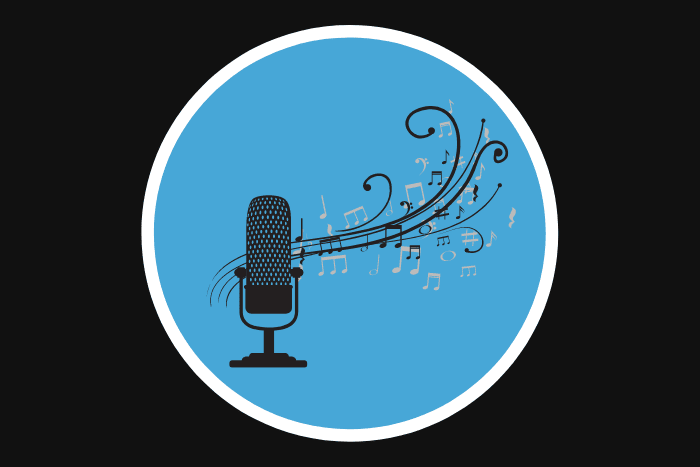
Hyperbole helps songwriters paint a vivid picture for the listener. Here are some examples you might find familiar.
46. I’m Gonna Be (500 Miles) by The Proclaimers
But I would walk five hundred miles
And I would walk five hundred more
Just to be the man who walked a thousand miles
To fall down at your door
47. I’d Lie for You (And That’s the Truth) by Meatloaf
I’d lie for you, and that’s the truth.
Do anything you ask me to
I’d even sell my soul for you
I’d do it all for you
If you just believe in me.
48. Grenade by Bruno Mars
I’d catch a grenade for ya (yeah, yeah, yeah)
Throw my hand on a blade for ya (yeah, yeah, yeah)
I’d jump in front of a train for ya (yeah, yeah, yeah)
You know I’d do anything for ya (yeah, yeah, yeah)
49. Blank Space by Taylor Swift:
Boys only want love if it’s torture
Don’t say I didn’t say, I didn’t warn ya
50. It’s Raining Men by The Weather Girls
It’s raining men, hallelujah
It’s raining men, every specimen
Tall, blonde, dark, and lean
Rough and tough and strong and mean
51. So Happy I Could Die by Lady Gaga
Happy in the club, with a bottle of red wineStars in our eyes ’cause we’re having a good time
Eh-eh, eh-eh
So happy I could die
52. Cry Me a River by Ella Fitzgerald
Now you say you’re lonely
You cried the long night through
Well, you can cry me a river
Cry me a river
I cried a river over you
53. Killing Me Softly by Roberta Flack
Strumming my pain with his fingers
Singing my life with his words
Killing me softly with his song
Killing me softly with his song
Telling my whole life with his words
Killing me softly with his song
Editor’s Note: I’ve linked to the Fugees cover of Killing Me Softly because my wife used to sing this version when we did Karaoke every Sunday night.
Yup, I used to be cool. Sort of.
– Pat
(PS: Sorry, Roberta Flack)
54. Friends In Low Places by Garth Brooks
I’ve got friends in low places
Where the whiskey drowns
And the beer chases my blues away
And I’ll be okay
Related Terms
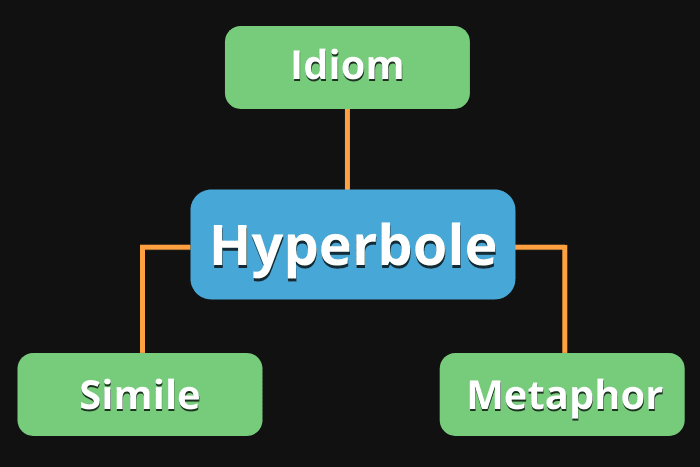
Hyperbole is sometimes confused with similes, metaphors, or idioms.
Simile and metaphor are literary terms used for comparisons, idioms are unique expressions, and hyperbole uses dramatic exaggeration to make a point.
Hyperbole vs. Simile
A simile uses the words like or as to make a comparison, but the comparison lacks the exaggeration of hyperbole.
Let’s look at the following simile.
Her smile was as bright as the sun.
It’s a bit of an exaggeration as nothing is as bright as the sun. But the point is made that she has a bright, engaging smile. And it’s not an unexpected comparison.
Now, look at a similar sentence using hyperbole.
That smile could move mountains. (Kylie Scott)
Now that is an exaggerated, attention-grabbing statement of hyperbole. After all, while one’s smile might be dazzling, it’s never going to move mountains.
Hyperbole vs. Metaphor
The difference between hyperbole and a metaphor is subtle but significant.
Hyperbole uses exaggeration to describe something, while metaphors use one thing to represent something else.
For example, if I were to say, It’s the North Pole out there, you’d know that I’m comparing how cold it is outdoors to the frigid temperatures of the North Pole.
Now consider this tale from Paul Bunyan.
Well now, one winter it was so cold that all the geese flew backward and all the fish moved south and even the snow turned blue.
Paul uses deliberate and comedic exaggeration to describe just how cold that winter was.
Hyperbole vs. Idiom
An idiom is a phrase whose meaning is unclear based on the words used.
For example, if you say, I’m going to hit the sack, most people will know that you aren’t literally beating up cloth bags. They understand that it’s an expression meaning you are going to bed.
On the other hand, hyperbole is an exaggeration used to emphasize a point. For example, I’m so tired I need toothpicks to hold my eyes open. We all know it to be an exaggerated statement calling attention to how tired you are.
Are You Ready to Use These Hyperbole Examples In Your Writing?
These hyperbole examples are an excellent resource for your creative writing endeavors.
The next time you need to add a flashy or gripping element to your story, you can turn to hyperbole to reel your readers in and keep them hooked.
Whether you’re writing poetry or songs or the next Great American Novel, adding hyperbole to your work can make it the best thing since the invention of sliced bread.
Which hyperbole will you use first?
Definition of Hyperbole
Hyperbole, derived from a Greek word meaning “over-casting,” is a figure of speech that involves an exaggeration of ideas for the sake of emphasis.
It is a device that we employ in our day-to-day speech. For instance, when you meet a friend after a long time, you say, “It’s been ages since I last saw you.” You may not have met him for three or four hours, or a day, but the use of the word “ages” exaggerates this statement to add emphasis to your wait. Therefore, a hyperbole is an unreal exaggeration to emphasize the real situation. Some other common Hyperbole examples are given below.
Common Examples of Hyperbole
- My grandmother is as old as the hills.
- Your suitcase weighs a ton!
- She is as heavy as an elephant!
- I am dying of shame.
- I am trying to solve a million issues these days.
It is important not to confuse hyperbole with simile and metaphor. It does make a comparison, like simile and metaphor. Rather, hyperbole has a humorous effect created by an overstatement. Let us see some examples from Classical English literature in which hyperbole was used successfully.
Short Examples of Hyperbole
- A ton of worry was lifted from the beggar’s back when he received the alms.
- He saw a man as tall a power poll.
- He saw his childhood friend after ages.
- The weather was so hot that literally everything was on fire.
- The boy was dying to get a new school bag.
- The teacher told his students not to repeat that mistake for the umpteenth time, but to no avail.
- He was in such a hurry that he drove his car at a bazillion miles per hour.
- The minister told the guests that the couple’s friendship was deeper than the sea, and sweeter than honey.
- The blacksmith’s hand was harder than the rock.
- Their headmaster was omnipresent, as he seemed to be all around the school all the time.
- The businessman was so busy that he was attending to a million calls simultaneously.
- The old man was older than the Himalayas.
- The mule is able to lift tons of weight uphill.
- His classmates laughed at him, saying he had a pea-sized brain.
- John was called the elephant of the class for his clumsiness.
Hyperbole Examples in Literature
Example #1: Babe the Blue Ox (American Folklore)
In American folk lore, Paul Bunyan’s stories are full of hyperboles. In one instance, he exaggerates winter by saying:
“Well now, one winter it was so cold that all the geese flew backward and all the fish moved south and even the snow turned blue. Late at night, it got so frigid that all spoken words froze solid afore they could be heard. People had to wait until sunup to find out what folks were talking about the night before.”
Freezing of the spoken words at night in winter, and then warming them up in the warmth of the sun during the day are examples of hyperbole, which has been effectively used in this short excerpt from an American folktale.
Example #2: Macbeth (By William Shakespeare)
From William Shakespeare’s Macbeth, Act II, Scene II:
“Neptune’s ocean wash this blood
Clean from my hand? No. This my hand will rather
The multitudinous seas incarnadine,
Making the green one red.”
Macbeth, the tragic hero, feels the unbearable prick of his conscience after killing the king. He regrets his sin, and believes that even the oceans of the greatest magnitude cannot wash the blood of the king off his hands. We can see the effective use of hyperboles in the given lines.
Example #3: As I Walked One Evening (By W. H. Auden)
“I’ll love you, dear, I’ll love you
Till China and Africa meet,
And the river jumps over the mountain
And the salmon sing in the street,
I’ll love you till the ocean
Is folded and hung up to dry.”
The use of hyperbole can be seen in the above lines in the meeting of China and Africa, the jumping of the river over the mountain, the singing of salmon in the street, and the ocean being folded and hung up to dry are exaggerations, not possible in real life.
Example #4: The Adventures of Pinocchio (By C. Colloid)
“He cried all night, and dawn found him still there, though his tears had dried and only hard, dry sobs shook his wooden frame. But these were so loud that they could be heard by the faraway hills …”
The crying of Pinocchio all night until his tears became dry is an example of Hyperbole.
Example #5: The Heart of Darkness (By Joseph Conrad)
“I had to wait in the station for ten days – an eternity.”
The act of waiting ten days seemed to last forever and never end.
Example #6: Two Sunflowers Move in the Yellow Room (By William Blake)
“Ah, William, we’re weary of weather,”
Said the sunflowers, shining with dew.
“Our traveling habits have tired us.
Can you give us a room with a view?”
They arranged themselves at the window
And counted the steps of the sun,
And they both took root in the carpet
Where the topaz tortoises run.
This is a poem by William Blake in which he uses exaggerated personification of sunflowers, which is akin to hyperbole.
Example #7: A Red, Red Rose (By Robert Burns)
“As fair art thou, my bonnie lass,
So deep in luve am I;
And I will love thee still, my dear,
Till a’ the seas gang dry.
Till a’ the seas gang dry, my dear,
And the rocks melt wi’ the sun:
O I will love thee still, my dear,
While the sands o’ life shall run.”
The poet Robert Burns gives many examples of hyperbole in this piece. The poet says that he would love his beloved until the seas are dried up, and the rocks are melted.
Function of Hyperbole
The above arguments make clear the use of hyperbole. In our daily conversation, we use hyperbole to create an amusing effect, or to emphasize our meaning. However, in literature it has very serious implications. By using hyperbole, a writer or a poet makes common human feelings remarkable and intense to such an extent that they do not remain ordinary. In literature, usage of hyperbole develops contrasts. When one thing is described with an over-statement, and the other thing is presented normally, a striking contrast is developed. This technique is employed to catch the reader’s attention.
Hyperboles are statements that are not meant to be taken literally and are used for emphasis, or extreme exaggeration, only. Hyperboles help to further the writer’s important themes or make a specific impact on a reader. They are used as figures of speech in literature and can transform the way a reader takes in and processes a word, phrase, or an entire passage of writing. It’s easy to use the device humorously in order to make the reader laugh or to use it seriously in order to stress something dramatic.
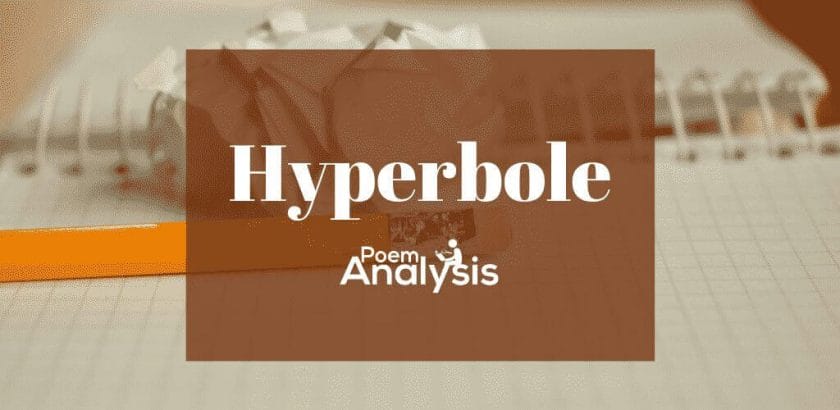
Hyperbole Definition
The word “hyperbole” originates from the Ancient Greek ‘huperbolḗ’. It is a device present in rhetoric, oratory, and poetry.
The former, rhetoric, is the art of persuasion that studies the capacity of a writer or speaker to persuade/motivate audiences. In this context, hyperbole is sometimes seen in definitions along with the word “auxesis,” meaning “growth.” This word is connected to rhetorical analysis and can refer to a number of different ways of growing an argument; for example, a hyperbolic statement, a climax, or a repetition of arguments, known as amplification.
Examples of Hyperbole in Literature
A Character by William Wordsworth
Let’s consider William Wordsworth’s ‘A Character.’ This five-stanza poem speaks on the moral character of a segment of mankind in relation to the feelings a speaker has for the intended listener. Towards the end of the poem, after using several other poetic techniques, Wordsworth uses a hyperbolic statement in the third line of the last stanza:
This picture from nature may seem to depart,
Yet the Man would at once run away with your heart;
And I for five centuries right gladly would be
Such an odd such a kind happy creature as he.
The phrase “And I for five centuries right gladly would be” is a clear hyperbolic expression. He suggests that he would be content for five hundred years if he could spend them with the intended listener of ‘A Character.’
Plenty by Isabel Dixon
Another more recent example can be found in Isabel Dixon’s ‘Plenty.’ This poem is eight stanzas long and describes the relationships a speaker had while she was a child and how she interprets them now that she is an adult. In the fourth stanza, while speaking about the passage of time in combination with a lack of basic household goods, she says:
Even the toilet paper counted,
and each month was weeks too long.
Her mouth a lid clamped hard on this.
The phrase, “each month was weeks too long” helps the reader understand how desperate the speaker felt. She channels her mother’s experience, tapping into the misery of months without money or proper nourishment for her children.
Television by Roald Dahl
One final example, in a very different piece of poetry, is ‘Television’ by Roald Dahl. This poem speaks on themes of childhood and entertainment. The poem describes in outrageous detail the dangers of television and what a parent can do to save their child. Dahl’s speaker uses hyperbolic statements to reflect on the dangers of watching too much TV. They range from a child’s brain-melting to losing the desire to understand the world. For example, lines thirty-one through thirty-three:
HIS BRAIN BECOMES AS SOFT AS CHEESE!
HIS POWERS OF THINKING RUST AND FREEZE!
HE CANNOT THINK — HE ONLY SEES!
In combination with the capitalization of these lines, as well as the exclamation points, the hyperbolic expressions in ‘Television’ seek to convince a child’s parents not to let their kid watch TV.
Hyperbole in Common Speech
Sometimes hyperbolic statements are obvious and, when used, strike the listener as unusual. But, more often than not, hyperbole crops up in common speech without the speaker or listener noticing. For example, if someone says, “I could sleep for days” or “I’m starving.” These phrases, when analyzed, are obvious exaggerations of the truth. But, they are used in order to make a larger point. If someone said, “I could sleep for 8 hours” rather than “day,” the impact of the statement is greatly decreased.
Why Do Writers Use Hyperboles?
When it comes to the written word, hyperbole is pushed to its limit. With an artistic license, writers have crafted complex, baffling, and often amusing hyperbolic statements that are, more often than not, not meant to be taken seriously. It’s a rhetorical device, sometimes incorporating metaphors or similes, that helps the user make a point they wouldn’t otherwise be able to. Literal language, which is drawn from reality without exaggeration or embellishment, wouldn’t be enough in these circumstances.
Context is of the utmost importance when using hyperbole. Depending on the setting and emotional landscape in a poem or a specific line of verse that takes place, hyperbole can come across quite differently. They can be, as stated above, used humorously in order to reiterate the strangeness of a situation, the actions of an unusual character, or an odd confluence of events. Hyperboles can also help to depict much darker scenes as well. Strong emotions, such as moments of distress, fear, and terror can be conveyed quite clearly through exaggerated statements that in other situations would not make sense or would seem overwrought.
- Archaism: a figure of speech in which a writer’s choice of word or phrase is purposefully old-fashioned.
- Attitude: refers to the tone a writer takes on whatever they are writing.
- Colloquial Diction: conversational in nature and can be seen through the use of informal words that represent a specific place or time.
- Euphemism: an indirect expression used to replace something that is deemed inappropriate or crude.
Other Resources
- Read: Examples of Hyperbole
- Watch: What is Hyperbole?
- Watch: Hyperboles in Disney Movies
: extravagant exaggeration (such as «mile-high ice-cream cones»)
Did you know?
In the 5th century B.C.E. there was a rabble-rousing Athenian politician named Hyperbolus. Since Hyperbolus is known to history as a demagogue, i.e. “a leader who makes use of popular prejudices and false claims and promises in order to gain power,” one might be tempted to assume that his name played a role in the development of the modern English word hyperbole, but that’s not the case. Although that noun does come to us from Greek (by way of Latin), it does so instead from the Greek verb hyperballein, meaning “to exceed,” which itself was formed from hyper-, meaning “beyond,” and ballein, “to throw.” Hyperbolus may have preferred to take the undeserved credit, of course.
Did you know?
This word doesn’t behave the way we expect a word that’s spelled this way to behave. It begins with the prefix hyper-, which we know in words like hyperlink (and in the adjective hyper itself), but instead of having the accent, or emphasis, on the first syllable—HYE-per-link—it has the accent on the second syllable: hye-PER-buh-lee. And then there’s that bole. It should sound just like the word bowl, right? Nope. Instead it’s two syllables: buh-lee .
The word comes to English directly from Latin, but the Latin word is from a Greek word that has one crucial visual difference. It has a line, called a macron, over the final e: hyperbolē. The macron tells us that the vowel is pronounced like ee .
The fact that hyperbole is pronounced in a way counter to the usual workings of English pronunciation gives a hint as to the word’s history in the language. Although these days you might encounter hyperbole in a magazine at the doctor’s office, the word’s first use was technical. It’s from the field of rhetoric, which makes it at home with terms like metaphor, trope, and litotes. And speaking of litotes (pronounced LYE-tuh-teez ), that term is an approximate antonym of hyperbole. It refers to understatement in which an affirmative is expressed by the negation of the contrary, as in «not a bad idea» or «not unpleasant.»
Synonyms
Example Sentences
Four decades later we’re all blabbermouths, adrift on a sea of hyperbole, shouting to be heard.
—
… balanced on the razor edge of anachronism, creating a rich stew of accepted and invented history, anecdote, myth and hyperbole.
—
Even if we discount the hyperbole evident in such accounts, they were far from inventions.
—
“enough food to feed a whole army” is a common example of hyperbole
Recent Examples on the Web
Maybe draft hype sounds like hyperbole with Miami taking a win-now approach after years of rebuilding in previous offseasons.
—
That might sound like hyperbole, but has any Raven made more thrilling plays this summer?
—
More than a bit of hyperbole from state Representative Lori VanWinkle.
—
Book a cruise with NCL Virgin Voyages’ Mega Rock Star Quarters The largest suites on the adults-only Virgin Voyages ships are called Mega Rock Star Quarters, and the rock star moniker isn’t just hyperbole—some of the 2,147 square feet of floor space is dedicated to a personal music room.
—
That’s not hyperbole.
—
This is not hyperbole.
—
That isn’t hyperbole.
—
This hardly was hyperbole.
—
See More
These examples are programmatically compiled from various online sources to illustrate current usage of the word ‘hyperbole.’ Any opinions expressed in the examples do not represent those of Merriam-Webster or its editors. Send us feedback about these examples.
Word History
Etymology
Latin, from Greek hyperbolē excess, hyperbole, hyperbola, from hyperballein to exceed, from hyper- + ballein to throw — more at devil
First Known Use
15th century, in the meaning defined above
Time Traveler
The first known use of hyperbole was
in the 15th century
Podcast
Get Word of the Day delivered to your inbox!
Dictionary Entries Near hyperbole
Cite this Entry
“Hyperbole.” Merriam-Webster.com Dictionary, Merriam-Webster, https://www.merriam-webster.com/dictionary/hyperbole. Accessed 13 Apr. 2023.
Share
More from Merriam-Webster on hyperbole
Last Updated:
7 Apr 2023
— Updated example sentences
Subscribe to America’s largest dictionary and get thousands more definitions and advanced search—ad free!
Merriam-Webster unabridged
A hyperbole is a figure of speech that deliberately exaggerates a part of your statement to bring it under spotlight. They’re used mainly for emphasizing a point and highlighting difference between two things.
This post covers more than 100 examples of hyperbole categorized under increasing level of difficulty: beginner to advanced.
More resources on hyperbole:
- What is hyperbole and how to write it in step-by-step way?
While going through the examples that follow, pay attention to how the hyperbole exaggerates. My comments that go with examples are in square brackets.
Beginner-level hyperboles
Kids and other beginners can start with writing hyperboles that require absolute words such as most, best, worst, none, never, all, always, everything, and so on, which almost always exaggerate the situation. In the examples below, absolute words that make the sentence a hyperbole have been highlighted.
1. He is always on his mobile. [Comment: One can’t be always on phone.]
2. This is the funniest joke I’ve ever heard. [In rare case, it could be, but mostly it’ll be an exaggeration.]
3. He knows everything about Covid-19.
4. He never stopped complaining about his workplace.
5. There can’t be anything cuter than this cat.
6. This is the easiest exam in the world.
7. It’s the best day of my life.
8. This is the best restaurant in the world.
9. New York City never sleeps.
10. The two hours I spent watching that movie were the worst two hours of my life.
11. At one point, the longest ever tennis match, played between John Isner and Nicolas Mahut, seemed that it would never end.
12. Novak Djokovic was invincible in Grand Slams in 2021.
13. You and Scully seem to have no meeting point, much like parallel lines.
14. Little Truman had a voice so high it could only be detected by a bat. Tennessee Williams on Truman Capote
15. Goodness is the only investment that never fails. Henry David Thoreau
16. A flaw in the human character is that everybody wants to build and nobody wants to do maintenance. Kurt Vonnegut, Jr.
17. A tart temper never mellows with age, and a sharp tongue is the only edged tool that grows keener with constant use. Washington Irving
Such hyperboles can be written by stretching the attribute you want to hyperbolize to ridiculous level. Examples:
18. While making the omelette, I puffed it so much that it hit the ceiling. [Ordinarily, the omelette would’ve puffed few centimeters. You stretch this attribute to a ridiculous height.]
19. Kids are so overloaded these days. Just look at their bags; they weigh a ton. [Regular bags weigh in kilograms, but here the weight has been stretched to a ridiculous level, a ton.]
20. He has ice in his veins. [Coolness has been stretched to ice.]
21. He hit the ball so hard that it landed on moon.
22. She can pull off complex multiplications in a blink. [Anyone would normally take at least few minutes to pull off complex multiplications, but here the time taken has been stretched to just a blink.]
23. You speak so loudly. You can be heard from miles.
24. I’ve so much to study for the exam. It’ll take years to finish.
25. The AC’s cold blast froze my blood.
26. The car cost me millions.
27. We should be partners for the next seven lives.
28. The meeting went on for what seemed like an eternity.
29. The new rules are taking forever to complete.
30. I had to finally switch off the fan as it threatened to blow me away. [Blowing papers has been stretched to blowing a person.]
31. Your decrepit furniture seems to be from Jurassic era. [A decade or two has been stretched to millions of years.]
32. The child cried a river and drowned the place. [Tears have been stretched to a river.]
33. I tried golf thousand times, but in the end, I couldn’t learn it.
34. I was scared to death.
35. He stared through my soul.
36. My new shoes, little bit tight, are killing me. [Discomfort has been stretched to killing.]
37. Your gaming laptop seems to be worth its weight in gold.
38. I’m dead tired; I can sleep for days.
39. I called you thousand times yesterday, but because you didn’t pick up, I cancelled my plan.
40. I know every line of the novel; I’ve read it hundred times.
41. I could smell freshly-baked apple pie from miles.
42. I’m dying of hunger.
43. I searched every corner of the city to find you.
44. There are thousand reasons why our trains are rarely on time.
45. We’re meeting after ages.
46. I’ve walked thousand miles to meet you.
47. Come on, get up! Even a 5-year-old would. You aren’t hurt as bad as you think.
48. Quick! I’ve million other things to do.
49. I’ll die without you.
Advanced-level hyperboles
You can write advanced hyperboles by replacing the stretched attribute we saw in intermediate-level hyperboles with an unlike thing. The more striking and imaginative your unlike thing is, the better your hyperbole is. Examples:
50. There are more reasons to get vaccinated against Covid virus than the number of people who died because of the virus.
[An intermediate-level version of this hyperbole would be: There are thousand reasons to get vaccinated against Covid virus. The advanced-level hyperbole compares number of reasons with an unlike thing – number of people who died because of the virus – and requires bit more thinking than stretching 4-5 reasons to thousand. Note that the fundamental of stretching to a ridiculous level holds in advanced-level hyperboles as well.]
51. Your smile is more infectious than Covid virus. [Infectiousness of Covid virus is strikingly different from infectiousness of smile.]
52. He ran faster than cheetah to fetch wine from the nearby grocery store. [This isn’t a particularly good hyperbole because comparing a human runner with cheetah has been overused. In other words, comparison isn’t very striking.]
53. She is as lean as a toothpick. [This too has been overused, and hence it’s not a good one.]
54. You sneezed so loudly that the vase on the table shook.
55. You’ve the memory of a wild elephant.
56. Your smelly socks can kill a rat.
57. On hearing the result, I was motionless as a corpse.
58. He talks like a bullet train.
59. I would prefer Titanic to this helicopter. [This one is a paraphrase from the movie Mysterious Island. The helicopter looked well past its utility.]
60. Your mouth smells like the mouth of a carnivore.
61. The spot on your collar is as big as an island on Amazon.
62. The mole on your forearm is bigger than a saucer.
63. You can beat a photocopier at copying assignments in both speed and resemblance.
64. The manager then exploded like dozen hand grenades, giving piece of his mind to those present. [You could’ve also stretched the manager’s explosive outburst to a nuclear bomb or a volcano.]
65. She is so slim that she can pass through the eye of a needle.
66. You drive more recklessly than a man drunk on a bottle of whiskey.
67. Monkeys, which seem to be as abundant as salt in the sea, have been a menace in this town.
68. It’s difficult to get rid of cockroaches. They’re as many as stars in the galaxy.
69. I couldn’t eat the meal because it was as cold as an iron rod in freezing winter.
70. You’re as ageless as the redwood trees in California.
71. My phone rang with what seemed like police siren.
72. To be in time for the show, he drove faster than a Formula-1 race car.
73. The journalists fired rapid-fire questions at the Governor like a machine gun.
74. Your necklace sparkles brighter than the sun.
75. My school band was as famous as the Beatles in 60s.
76. The car has gotten so hot that I can make an omelette on the bonnet.
77. This smoothie is used oil compared to the smoothie you make.
78. He is like a grenade with the pin pulled, ready to go off any time.
79. I felt as lonely in the new city as Lystrosaurus felt more than 250 million years ago when almost everything died on the planet.
80. You leave a mile-wide trail of personal data on the internet for advertisers to exploit. [An intermediate-level version of this hyperbole would be: You leave a bazillion amount of personal data on the internet for advertisers to exploit.]
81. His song was so jarring that it shattered windowpanes. [A less striking hyperbole would be: His song was so jarring that everyone left the room.]
82. Surprise quiz in this course is as inevitable as death.
83. The food was so delicious that I almost ate my fingers.
84. Your expressions during the play were as animated as a suit on a hanger.
85. His voice was so melodious that we dozed off.
86. In these clothes, you’re looking like a monkey in dinner jacket.
87. His joke was as gross as a cockroach in soup.
88. During probation period, I felt like a bug under the microscope.
89. I felt as abandoned as a used Kleenex.
90. You’re such a chatterbox that even walls get tired listening to you. [A beginner-level version of this hyperbole would be: You’re such a chatterbox that no one wants to listen to you.]
91. The size of serving in your restaurant is like serving a mouse to a hungry lion.
92. You dance worse than popcorn in a machine.
93. The fun & frolic was as boisterous as the stormy sea.
94. It was so cold that even polar bears were shivering.
95. I nearly died laughing.
96. The leaping catch by the fielder took my breath away.
97. She was so mad that she was spitting fire.
98. Your handwriting seems to be the walk of an ant with its legs dipped in ink.
99. The commander’s shout to his unit shook the earth.
100. Your oversized skirt can be used as a tent.
101. It’s so hot here. I feel as if I’m in an oven.
- Definition & Examples
- When & How to Write a Hyperbole
- Quiz
I. What is Hyperbole?
Hyperbole (pronounced ‘high-purr-bo-lee’) is a figure of speech in which an author or speaker purposely and obviously exaggerates to an extreme. It is used for emphasis or as a way of making a description more creative and humorous. It is important to note that hyperbole is not meant to be taken literally; the audience knows it’s an exaggeration.
For example:
That suitcase weighed a ton!
In this example, the speaker claims that a suitcase weighed a ton–two thousand pounds! Of course, this does not mean that the suitcase literally weighed a ton. The speaker is using hyperbole in order to emphasize that the suitcase feels very heavy.
Here are a few more examples of hyperbole often used in everyday conversation:
Example 1
She’s going to die of embarrassment.
This does not mean that the girl is going to get sick or that her heart will stop due to embarrassment. Instead, the speaker is using hyperbole to emphasize just how embarrassed she’s going to feel.
Example 2
Spring break will never come.
This example, like “I haven’t seen you in a million years!” serves to emphasize how long a period of time feels. Sometimes, especially in school, it feels as if time has slowed down and vacation will never come. We know this isn’t true, but we use hyperbole to communicate how things feel to us.
III. The Importance of Hyperbole
Hyperbole is often used in day-to-day speech. For example, upon seeing your friend after a long absence, you may say, “I haven’t seen you in a million years!” You and your friend both know that this is not literally the case. Here, hyperbole is used to emphasize how long it feels since you last saw your friend. It uses exaggeration to emphasize a certain characteristic of something, and especially how it feels. Hyperbole can be used to communicate all kinds of feelings and amuse or surprise people with the creativity of a description.
Hyperbole is also often used in creative writing just to make a description more amusing or creative. For example, it is more interesting to say “she had a brain the size of planet” than “she was really smart.” It is always better to describe something in an original way and hyperbole is a great opportunity to inject feeling and humor into a description.
IV. Examples of Hyperbole in Literature
We often use hyperbole in everyday speech, but we also use it in prose and poetry. For example, in love poetry, the speaker may use hyperbole to emphasize their intense passion and admiration for the beloved.
Example 1
American poet W.H. Auden writes in “As I Walked Out One Evening,”
I’ll love you, dear, I’ll love you
Till China and Africa meet,
And the river jumps over the mountain
And the salmon sing in the street.
When will China and Africa meet? How can a river jump over a mountain? And when will salmon be intelligent enough to sing or evolved enough to walk the streets? Of course, none of these things will happen, so it implies that the author will love her forever. W.H. Auden is using hyperbole to emphasize the strength of his love.
Example 2
Joseph Conrad emphasizes the passing of time in the novel “Heart of Darkness”:
I had to wait in the station for ten days– an eternity.
Ten days is by no means an eternity, forever, but it felt like it.
V. Examples of Hyperbole in Pop Culture
Figures of speech are not only for classic literature. They are also used in popular culture.
Example 1
One place where you’ll see hyperbole is in commercials and advertisements. For example, see this slogan from Altoids:
Mints so strong they come in a metal box.
This description implies that the mints are so strong that they need to be contained in a metal box rather than paper or plastic packaging. Of course this isn’t literally true, but it emphasize just how strong this breath mint is. Such a description is funny in its exaggeration and may attract those looking for a stronger mint.
Example 2
For another set of hyperboles, take a glance at Apple advertising:
The new iPhone is ‘bigger than bigger.’
We know this isn’t possible. Advertisers are using hyperbole to emphasize that the new iPhone is really, really big!
On the new iPad:
Let them choreograph a recital. Explore the North Pole. Organize a food drive. And take their entire songbook caroling.
Most likely, the average iPad user does not have such high-flying plans for their iPad. The use of hyperbole though, links inspiring, charitable, and artistic ideas with the product in the buyer’s mind. Good advertisers use good hyperbole. The truth doesn’t matter in advertising. It is entirely how you make people feel that causes them to spend their money on something and advertisers know this, so hyperbole is their best friend.
Hyperbole fills our daily conversation, advertisements, movies, TV shows, and music. It is a figure of speech that makes the world sound more colorful and stimulating and can be used to convey how strongly you feel about anything.
Example 3
In “Blank Space,” Taylor Swift claims:
Boys only want love if it’s torture.
Swift is not claiming that men want to be literally tortured in romantic relationships. She is using hyperbole to claim that men prefer relationships that are difficult and dramatic.
- Like the romantic poets that came before him, Sam Smith uses hyperbole to emphasize the strength and depth of his love in “Latch”:
How do you do it? You got me losing every breath. What did you give me to make my heart bleed out my chest?
What love could possibly cause Smith to lose his breath and to begin bleeding from his chest? A love that has been hyperbolized. Here, Smith uses the powerful figure of speech to emphasize the power of the feeling of love which has seized him.
VI. Related Terms
(Terms: simile and metaphor)
Simile
When using simile, a writer compares two different things using the words “like” or “as.” “As” can be used to indicate that two things are similar in some particular respect, but otherwise different, such as in “she’s as smart as Einstein.” Hyperbole also emphasizes a particular characteristic of something. However, simile is different from hyperbole in that it must use a “like” or “as” comparison and does not necessarily (but may) use exaggeration. For example, “she’s as smart as a teacher” is also a simile, but maybe not a hyperbole.
For example, “She is like a rose” is a simile which compares a woman to a rose (a beautiful flower), describing the woman as beautiful—or perhaps thorny. This cliché simile emphasizes her beauty, but does not necessarily exaggerate it. After all women are generally at least as beautiful as flowers if not more so. An example of hyperbole in the same situation would be “She is the most beautiful woman in the entire universe!”
Metaphor
Metaphor and hyperbole are similar in that both say something literally which is meant to be taken figuratively. Such as “that man is a monster.” Many hyperboles may use metaphor and metaphors may use hyperbole, but they are quite different. While hyperbole is exaggeration, metaphor is using one thing to represent something very different.
For example, a common metaphor is “the black sheep of the family.” We don’t literally mean that someone is a black sheep; a human being cannot literally be a sheep, unless this is a very strange science-fiction movie. But the black sheep stands for certain qualities of the family member in question. A black sheep is unusual and perhaps not accepted by its herd. Someone who is called a black sheep must be different from other family members in some way and may not be accepted by family members for that reason. This is not a hyperbole because no characteristics of the person are being exaggerated. An example of hyperbole in this situation would be “He has absolutely nothing in common with our family!” We know that this can’t be true; all family members share DNA and usually many experiences, but we use hyperbole to emphasize how different this one family member feels from the rest of the family.
Hyperbole Definition: A hyperbole is an extreme exaggeration used in writing for effect.
What is the definition of hyperbole? A hyperbole is a type of figurative language. Therefore, a hyperbole is not meant to be taken literally. A hyperbole is an overstatement that exaggerates a particular condition for emphasis.
Example of Hyperbole
- I’m so hungry I could eat a horse.
This example of hyperbole exaggerates the condition of hunger to emphasize that the subject of this sentence is, in fact, very hungry.
This person has no intention of literally eating a horse but is trying to figuratively communicate his hunger using a hyperbole for effect (see literally vs. figuratively).
Modern Examples of Hyperbole

- I’m dying of laughter.
- The subject is not literally dying but is using hyperbole to figuratively communicate how hard he is laughing.
- This package weighs a ton.
- The package does not literally weigh a ton. This sentence uses hyperbole to exaggerate the weight of the very heavy package.
- I haven’t seen Jamien in ages.
- Ages have not literally past since the subject has seen Jamien. The subject is figuratively stating that he hasn’t seen Jamien in a very long time.
As you can see from these examples, the meaning of hyperbole is clear, and it is also clear that hyperbolic statements are not meant to be taken literally. They are hyperbolic by their very nature.
The Importance and Function of Hyperbole

Hyperboles, however, should be used sparingly in writing and in speech. The reason being the intention is to bring attention to a particular concept. If hyperboles are overused, a “boy who cried wolf” situation occurs, and the hyperbole loses effect.
This is to say, if every sentence were a hyperbole, the audience would not take the writer or speaker seriously. They would be desensitized to all of the exaggerations.
However, when a hyperbole is used appropriately, its effect is purposeful and emphatic, causing the reader to pay attention to that particular point.
Examples of Hyperbole in Literature

Hyperbole Example in Literature
Mark Twain wrote in “Old Times on the Mississippi”:
- “I was helpless. I did not know what in the world to do. I was quaking from head to foot, and could have hung my hat on my eyes, they stuck out so far.”
Here, Twain utilizes hyperbole to explain a state of being. In this excerpt, the speaker felt incredibly helpless and wracked with nerve. The speaker’s eyes were not literally sticking out, but Twain uses hyperbole to communicate just how helpless was the speaker’s state.
Hyperbole Example in Literature
Paul Bunyan is a famous tale in American folklore. The tale itself is a hyperbole (from Bunyan’s extreme size to his magnificent blue ox). A specific example from this tale includes:
- “Well now, one winter it was so cold that all the geese flew backward and all the fish moved south and even the snow turned blue.”
Clearly, none of these things actually occurred and this statement is not to be taken literally. Here, hyperbole is used for comedic effect and to communicate that the winter was a particularly cold one.
Hyperbole Example in Literature
Josef Conrad’s Heart of Darkness utilizes a hyperbole to exaggerate time.
- “I had to wait in the station for ten days—an eternity.”
“Ten days” is not literally “an eternity.” However, for this character, ten days felt like an incredibly long time, as indicated through the hyperbole.
Summary
What is a hyperbole? Hyperboles are used throughout literature, poetry, and even in speech.
In summary, what does hyperbole mean? Hyperboles are,
- extreme exaggerations
- used for emphasis/effect
- figurative language
- used sparingly with purpose
Contents
- 1 What is Hyperbole?
- 2 Modern Examples of Hyperbole
- 3 The Importance and Function of Hyperbole
- 4 Examples of Hyperbole in Literature
- 5 Summary
“My feet are killing me!”
“What do you have in this bag? It weighs a ton!”
“I’m drowning in paperwork.”
You’ve probably heard these common expressions before—you may have even thought the speaker was being a bit dramatic. That’s because they were using hyperbole.
What Is Hyperbole?
Hyperbole is extreme exaggeration used to emphasize a point. So instead of saying the bag is heavy in the example above, we say it “weighs a ton” (even though that probably isn’t true).
When you use hyperbole, you turn things up a million notches.
Hyperbole is a rhetorical device, literary device, and a type of figurative language.
Rhetorical devices are techniques and stylistic touches speakers and writers use to evoke a response in their audiences—usually, one that prompts the audience to see the speaker’s point of view.
Literary devices are a sub-category of rhetorical device. While rhetorical devices can be used in any form of speech or writing, literary devices are used only in literature.
When writers or speakers use figurative language, they use figures of speech, non-literal language, to emphasize an idea or emotion or provide a sensory experience.
As an ultra-exaggeration, hyperbole is certainly not to be taken literally.
We’ve used five examples of hyperbole throughout this article. See if you can spot them. To help you out, they’re all in bold.
How Do You Pronounce Hyperbole?
Tip: If you’re not sure how to pronounce the word hyperbole, here’s some help: high-PER-bo-lee
Hyperbole Is Extreme Exaggeration
In using hyperbole, you take an ordinary exaggeration to new heights.
If I’m really hungry, I might say, “I’m so hungry I could eat that entire pizza” even though I really mean I could eat a slice or two beyond my usual consumption.
My “entire pizza” comment is an exaggeration.
But if I say, “I’m so hungry I could eat every pizza in the pizzeria as well as the tables and ovens!” I have taken my exaggeration to the “nth” degree and have used hyperbole.
We all know exaggerators: those people who “had the flu” when they really had a cold or “had such a great time” when the party was just okay, or when they say “I was folding laundry for hours today,” when it only took one.
We learn to take what they say (or if we’re the exaggerators, expect others to take what we say) with that figurative grain of salt.
Hyperbole is such an obvious exaggeration that we need not take any grains of salt.
When we speak hyperbolically, we don’t expect people to take our words literally. At least that’s the way it’s supposed to work, but more on that later.
Why Use Hyperbole?
Hyperbole is a way to accentuate a point—with gusto. Sometimes that gusto is intended to be humorous, other times it’s used to rally support or execute sharp criticism or deep discontent.
Whatever the context, remember that the intent of hyperbole is to add unmistakable emphasis.
Hyperbole is figurative language because it is used intentionally. The speaker knows that the hyperbole is an exaggeration and knows the receiver will receive it as such: that’s the point.
Using Hyperbole in Everyday Speech
We use hyperbole often in our everyday speech. You’ve probably said or heard versions of many of these examples:
- I’m so confused my head is spinning.
- I have mountains of paperwork to finish!
- I haven’t eaten since lunch. I’m about to die of hunger.
- I’ve told you a million times!
- That care cost her an arm and a leg.
- You have enough food to feed an army!
That list is just a start. I could fill a library with all of the hyperboles we use in everyday conversation!
What Are Some Hyperbole Examples in Movies, Literature, and Music?
Writers know hyperbole is an effective tool, eliciting strong reactions from viewers, readers, and listeners.
Sometimes they generate loud laughs at their over-the-top ridiculousness, other times they give insight into how the writer or a character feels about or perceives something.
For some over-the-top ridiculousness, look no further than John C. Reilly (as Dale Doback) and Will Ferrell (as Brennan Huff) in Stepbrothers.
In this film, the two are pathetic, spoiled 40-somethings still sleeping in twin beds, still eating chicken nuggets, and still depending on their respective single parents to supply their every basic need (and that’s not a hyperbole).
When their parents get married, the two fall into instant childish competition:
Brennan: I have a green belt. Read it and weep.
Dale: I don’t believe in belts. There should be no ranking system for toughness. One time I wrestled a giraffe to the ground with my bare hands.
This hyperbole serves double duty: it makes the audience laugh at the utter stupidity of the claim and the character who thinks anyone would believe that claim, but for the character Dale, it “reveals” his perceived superhuman, manly strength.
Then we have hopeful Jack (Leonardo DiCaprio), arms outstretched at sunset on the still floating Titanic yelling “I’m king of the world!”
Of course he’s not. He’s just a poor young man looking for a new life. But we get the message. With his new love, Rose, he has everything.
When Is Hyperbole Used in Literature?
Shakespeare’s characters are well-known for expressing their emotions through hyperbole. His plays provide tons of examples.
In Act III scene iii of Romeo and Juliet, Romeo is banished from Verona, where his love, Juliet lives. In his emotional torment he cries, “[t]here is no world without Verona walls, / But purgatory, torture, hell itself.”
In Act V scene i of Hamlet, after Laertes expresses (also hyperbolically) his grief over his sister Ophelia’s death, Hamlet says, “I lov’d Ophelia. Forty thousand brothers / Could not (with all their quantity of love) / Make up my sum.”
In her memoir I Know Why the Caged Bird Sings, Maya Angelou uses hyperbole to allow her childhood perspective to come through to the reader.
To emphasize the pain she felt as a young child because of an infected tooth, Angelou writes “I prayed earnestly that I’d be allowed to sit under the house and have the building collapse on my left jaw.”
In another instance, when three-year-old Maya is in church and tries to leave the building because she has to urinate desperately, Angelou recounts her feelings this way:
“…I knew I’d have to let it go, or it would probably run right back up to my head and my poor head would burst like a dropped watermelon, and all the brains and spit and tongue and eyes would roll all over the place.”
In literature, hyperbole heightens our understanding of a character’s feelings, actions, or experiences.
What Are Some Examples of Hyperbole in Songs?
Songs often express emotion, so it makes sense that they are a reliable resource for hyperbole.
Take Bruno Mars and “Grenade.” In this song, the speaker/singer is so dedicated that he tells his lover,
I’d catch a grenade for ya
Throw my hand on a blade for ya
I’d jump in front of a train for ya
A nice sentiment, but would he really?
Bruno is not alone, not by a long shot. The Beatles reminded us that “All You Need is Love.” Taylor Swift sang “And you’ve got a smile / That can light up this whole town” and Roberta Flack confessed (he was) “killing me softly with his song.”
Read the lyrics of just about any other artist and you’ll find more hyperboles than you’ll find sand on the seashore.
How Is Hyperbole Used in News and Politics?
Hyperbolic headlines and stories sell newspapers and earn clicks.
When Michael Jackson died, Entertainment Weekly reporter Josh Rottenberg wrote that “Jackson’s sudden death brought… the entire world—to a stunned halt.”
Except it didn’t. I know I had to work that day, and there was plenty of traffic, so not everything shut down. But we get his point.
In a clever title that uses both the word and an example of hyperbole, the Wall Street Journal published “Climate Change Brings a Flood of Hyperbole” (Koonin, Steven. 10 August 2021).
A headline from a New York Post article by Karol Markowicz is titled “Vaccine mandates are a cruel stick to beat people with. They will tear us apart.”
What’s clear is Ms. Markowicz disapproval of vaccine mandates; also clear is that those mandates are not actually being used as physical sticks with which to physically beat people.
While the mandates are causing fierce disagreement, but we are not literally being ripped to shreds.
Our world leaders don’t shy away from hyperbole in politics. Many, if not most, political speeches make hyperbolic promises of how their country and world is/will be a better place, closer to perfect, if they are elected.
Some even use shameless hyperbole as they express themselves. Prime Minister Johnson and then-President Trump shared these thoughts about their own respective recoveries from COVID-19, as reported in the New York Times.
“I could refute these critics of my athletic abilities in any way they want: arm-wrestle, leg-wrestle, Cumberland wrestle, sprint-off, you name it,” Mr. Johnson said, sounding a bit like Mr. Trump, who despite being 74 and moderately obese attributed his recovery to the fact that he is a “perfect physical specimen.”
Using Hyperbole in Satire
Satirists love hyperbole more than anything—parents, children, spouses, or food. It’s an ideal vehicle for their mocking criticisms of the shortfalls they see in politics, society, and culture.
The debate over gun control has raged with intensity for the last decade or so in the United States.
After a series of school shootings (that continue still), the National Rifle Association proposed the idea of arming students.
In response, columnist Rich Cohen of the Washington Post countered with a satire filled with hyperbole.
“If one gun in the hands of, say, the principal is good, think of what hundreds of guns in the hands of students would do. I mean, who’s gonna take on that school?”
Is Hyperbole and Cliché the Same Thing?
Hyperbole and cliché are not the same. However, some hyperboles have become clichés due to overuse in everyday speech.
For example, if you say “I’m so hungry I could eat a horse!”, you’re using hyperbole and a cliché at the same time.
Clichés can make your writing feel stale. They can also alienate readers who aren’t familiar with them.
ProWritingAid’s Clichés and Redundancies Report will highlight any clichés in your writing so you can use hyperbole without sounding like a broken record (cliché alert!).
Try the Cliché Report now with a free ProWritingAid account.
Is Using Hyperbole Lying?
There are differing views on hyperbole. As for whether it’s truth or lie, that largely depends on how it’s used.
If hyperbole is not used intentionally in a statement, or the giver intends for the statement to be taken as literally true, the “hyperbole” label can be replaced with “falsehood.”
Other times, even if the giver uses it intentionally, the receiver still believes the statement, literally, which can lead to false beliefs.
Hyperbole Can Be Complicated
Author Kate DiCamillo said “Hyperbole is sometimes necessary to get at the truth. (It seems odd, doesn’t it, that we have to lie to tell the truth better)?”
Roman philosopher Lucius Seneca expressed his belief that hyperbole “asserts the incredible in order to arrive at the credible” in his letter, (translated) “On Benefits.”
In Rhetoric, Aristotle called hyperbole essentially immature, saying that “hyperboles are for young men to use…” that they show “vehemence of character, and this is why angry people use them more than other people.”
In Damon Linker’s article Our Dangerous Addiction to Political Hyperbole he writes, “And there we see the defining paradox of our time: The more we shout, the less we hear. The more we exaggerate, the less we believe. And the more we hype the truth as we perceive it, the less likely we are to think anyone else has anything valuable to say.”
What do you think about hyperbole? Useful device, or misleading trick? Let us know in the comments.
Are you prepared to write your novel? Download this free book now:
The Novel-Writing Training Plan
So you are ready to write your novel. Excellent. But are you prepared? The last thing you want when you sit down to write your first draft is to lose momentum.
This guide helps you work out your narrative arc, plan out your key plot points, flesh out your characters, and begin to build your world.

Studying examples of hyperbole will help you better understand how and when to use this literary device.
The English language has many figures of speech that students can study as they learn to write well. Simile, metaphor and idioms are all examples of this. Hyperbole is yet another.
Hyperbole occurs when someone exaggerates what they are saying to emphasize a point. This type of exaggeration happens often in everyday conversation, and it also shows up in literary works and modern pop culture.
Studying examples of hyperbole will help you identify it and then choose if you are going to use it in your writing.
Best Grammar Checker
Grammarly
Grammarly is a top spelling, grammar and plagiarism checker. It’ll help you find and fix errors fast, and it works everywhere. It’s trusted by millions of writers for a reason.
Become a Writer Today is reader-supported. When you buy through links on our site, we may earn an affiliate commission.
Contents
- Before Studying Examples of Hyperbole, Define Your Terms
- Common Examples of Hyperbole
- Examples of Hyperbole in Literature
- Examples of Hyperbole in Pop Culture
- A Final Word on Examples of Hyperbole
- FAQs on Examples of Hyperbole
- Author
Before Studying Examples of Hyperbole, Define Your Terms
Before you can explore various examples of hyperbole, you must know what it is, specifically.
The definition of hyperbole is the exaggeration of a phrase or statement to emphasize something. People usually know that hyperbole is not literal, but it makes a point stronger through overstatement.
According to the Merriam-Webster Dictionary, the word hyperbole comes from the Greek word hyperbolē. This means “excess,” which makes sense because that is exactly what the literary device is. You might also find our guide on the best euphemism examples for everyday use helpful.
Before looking at specific instances of this literary device in literature, first, take a look at these examples of hyperbole from everyday speech that you could add to your own creative writing. As you read them, consider how they exaggerate something to make a point and grab the reader’s attention:
1. After he lost weight, he was a toothpick
Clearly, he was not literally a toothpick.
2. Her brain was the size of a pea
Again, this cannot be literal
3. I love you to the moon and back
That’s a pretty long way to love someone.
4. Cry me a river
No one can cry a “river” of tears.
5. I slept like a rock
Rocks cannot sleep.
6. It’s light as a feather
Very rarely would this be literal.
7. It’s a jungle out there
Unless you live in South America, that’s hyperbole.
8. They’re walking slower than a turtle
This one could be true, but usually, it’s an exaggeration.
9. Superman was faster than a speeding bullet
Most likely, the speaker did not measure Superman’s speed to compare it to the bullet.
10. I could sleep a million years because I’m so tired
Since that’s longer than the typical lifespan, this is hyperbole.
11. It cost an arm and a leg
Most people won’t sever a limb to pay for something.
In each of these examples, a strict interpretation of the English writing would not make sense, but the reader knows it’s hyperbole and thus gets the writer’s meaning.
Examples of Hyperbole in Literature
Many famous literary works have hyperbole in them, both in poetry and fiction writing. Some of these include:
12. William Shakespeare’s Sonnet 147
In this sonnet, Shakespeare uses hyperbole quite often. The poet describes his love and desire for his beloved but exaggerates the feelings by making it appear the writer is sick with love.
“My love is as a fever, longing still
For that which longer nurseth the disease,
Feeding on that which doth preserve the ill,
Th’ uncertain sickly appetite to please.
My reason, the physician to my love,
Angry that his prescription are not kept,
Hath left me, and I desperate now approve
Desire is death, which physic did expect.
Past cure I am, now reason is past care,
And, frantic-mad with evermore unrest,
My thoughts and my discourse as madmen’s are,
At random from the truth vainly expressed.
For I have sworn thee fair, and thought thee bright,
Who art as black as hell, as dark as night.”William Shakespeare
No one who reads this poem really believes that Shakespeare is dying because of his love, which makes the hyperbole effective.
13. To Kill a Mockingbird by Harper Lee (0060935464)
In To Kill a Mockingbird, Harper Lee has several uses of hyperbole. One of the first is her description of Maycomb, the town that is the story’s setting. She says:
“A black dog suffered on a summer’s day; bony mules hitched to Hoover carts flicked flies in the sweltering shade of the live oaks on the square. Men’s stiff collars wilted by nine in the morning.”
Most likely, it would take more than one hour for a starched and ironed collar to droop. Thus, she is exaggerating just a bit to emphasize just how hot it was.
14. The Notorious Jumping Frog of Calaveras County by Mark Twain (1515251829)
In The Notorious Jumping Frog of Calaveras County, Twain describes a man, Jim Smiley, who is willing to bet on anything. He places a bet that his pet frog could job higher than any other out there.
When describing the extent Smiley would go to place a bet, Twain says:
“If there were two birds setting on a fence, he would bet you which one would fly first.”
Though this could be true, in theory, it is an exaggeration that emphasizes how likely it would be for the man to bet.
Examples of Hyperbole in Pop Culture
Because this form of extreme exaggeration is so effective at grabbing attention, many instances pop up in modern culture. Here are some of them.
15. The Ballad of Davy Crocket by Thomas W. Blackburn
In this song, hyperbole is very consistent. You may hear it in this stanza:
“Born on a mountain top in Tennessee
Greenest state in the land of the free
Raised in the woods, so he knew ev’ry tree
Kilt him a bear, when he was only three.”Thomas W. Blackburn
Clearly, it would not be possible for Crockett to know every tree in the woods, so this is an example of hyperbole. Some of the other claims the song makes are probably hyperbole, but because it is a tall tale, they may be more possible.
16. Meow Mix Marketing Jingle
The Meow Mix marketing jingle features some cats singing “Meow” and then a narrator stating, “It tastes so good, cats ask for it by name.” This is not true because cats do not actually ask for a specific food. The hyperbole works, though, because it gets the thought of Meow Mix being a tasty food into the mind of the listener.
17. Gillette Razor Marketing Jingle
Gillette uses the marketing jingle and tagline:
“Gillette, the best a man can get.”
This phrase is catchy because it rhymes and promises the world to the man who uses Gillette. However, most likely, they are not the world’s best razors, making this a type of figurative language.
A Final Word on Examples of Hyperbole
Exaggeration happens regularly in English writing and speaking. If you learn to identify hyperbole, you will better understand what a writer is saying. Like many literary elements, if you learn to use it well, you will create more powerful creative writing works. You might also be interested in these 5 subjunctive mood examples from famous works of literature.
Hyperbole works when the reader clearly knows that the statement is an exaggeration. By making the statement so absurd and far-fetched, you grab the reader’s attention and show them your true meaning.
FAQs on Examples of Hyperbole
What are some examples of hyperbole?
Here are some examples of hyperbole:
1. I searched the whole world before I found you.
2. The phone rang a thousand times, and you never answered.
3. Her bad breath could knock over a skyscraper.
Why should you use hyperbole?
Use hyperbole when you want to emphasize a point. Make sure that it stands out so the reader knows what you are doing. Avoid over-using hyperbole because it loses its effectiveness when you do.
Join over 15,000 writers today
Get a FREE book of writing prompts and learn how to make more money from your writing.
-
Nicole Harms has been writing professionally since 2006. She specializes in education content and real estate writing but enjoys a wide gamut of topics. Her goal is to connect with the reader in an engaging, but informative way. Her work has been featured on USA Today, and she ghostwrites for many high-profile companies. As a former teacher, she is passionate about both research and grammar, giving her clients the quality they demand in today’s online marketing world.
View all posts

